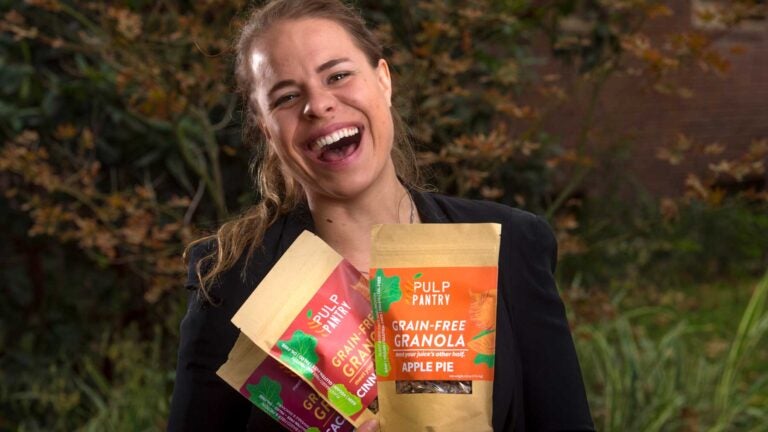
Environmental studies major Kaitlin Mogentale launched the startup Pulp Pantry a year ago. (USC Photo/Gus Ruelas)
Recent grad turns food waste into big opportunity for sustainable business
Trips to trendy juice bars help Mork Family Scholar realize how fruit and veggies end up in the trash
As carrot after carrot disappeared into her friend’s countertop juicer, Kaitlin Mogentale stared with her mouth agape at the growing pile of shredded pulp collecting in the device.
The USC environmental studies major had visited trendy Los Angeles juice bars many times, but she never realized how much of the fruit and vegetables needed to create her tasty beverage ended up in the trash.
“As a consumer, you don’t see all that waste,” she said. “What if we could use this pulp to create healthy snacks that are high in fiber and nutritional value?”
That moment of realization led Mogentale to launch Pulp Pantry, a startup that uses discarded pulp to create grain-free, high-fiber foods like granola, seed and veggie crisps and baking flours. Although the 24-year-old alumna created the business only a year ago, her products already have landed in select stores.
It’s not exactly the path Mogentale had envisioned when she came to USC as an undergraduate who was passionate about environmental justice. She had her sights set on becoming a marine biologist. But exposure to classes in social entrepreneurship and policy and planning shifted her focus toward having a broader impact on society.
She credits the change to her participation in the USC Mork Family Scholars Program, a highly selective scholarship initiative that covers tuition and provides an annual stipend to promising undergraduates at USC.
Great expectations
“They want you to do something extraordinary,” Mogentale said of USC Trustee John Mork and his wife, Julie, who created the program in 2011 with a $110 million donation. “The reason they are giving these scholarships is because they believe these students are going to do something that pushes them to their limits. It created that mindset of ‘always be pushing the limits’ and that I’m really worth something.”
Push the limits she did. She carried 20 units nearly every semester at USC, trying out subjects like nonprofit management and interning with the Garden School Foundation, a nonprofit that provides hands-on cooking and gardening classes to children in local Los Angeles schools.
Social entrepreneurship’s forward-looking nature gave Mogentale much-needed optimism, especially since she had popularized the term “ecodepression” among her peers as a way to describe how disheartened she had become about protecting the environment.
I want to be solutions-oriented.
Kaitlin Mogentale
“I’m way more of a positive person and I want to be solutions-oriented; I want to be a dreamer,” she said. “I’m just one person, but one person can change the world.”
Wasted fruit and vegetable pulp is one problem that inspired her vocation. Another is the food insecurity and nutrition issues she witnessed at a local elementary school during her Garden School Foundation internship.
Kids ate chips and snack cakes for breakfast, had fried chicken and French fries for lunch, and bought more junk food from street vendors on their way home, Mogentale said. Every meal featured highly processed food with low nutritional value.
“They weren’t used to eating vegetables,” she said. “They’d come into the garden and they’d never seen a fresh carrot or a fresh tomato.”
Food for thought
Mogentale is hopeful that she can build Pulp Pantry into a sustainable brand and gateway to get kids excited about fruits and vegetables. Less than 20 percent of Americans eat their recommended daily allotment of fresh fruits and veggies, she said, and increasing that figure could save billions in medical costs and thousands of lives every year.
For now, Mogentale is focused on perfecting a handful of core products and building her presence in Los Angeles. She is still the main engine of the operation, spending her weekends in a rented kitchen with 40 dehydrators, testing new recipes and combinations of pulp from beets, carrots, almonds, apples and other healthy staples.
She feels lucky to have graduated with no student debt thanks to the Mork Family Scholarship, a luxury she knows many people don’t have when leaving college.
“I was so blessed to have that peace of mind,” Mogentale said. “Now I can actually focus on building my business and putting money into that effort.”
She is also hoping to give back to USC, returning to campus to participate in panel discussions and sharing the lessons she has learned so far. Mogentale doesn’t view herself as a success story — she admits she is still making mistakes — but the message she stresses when giving advice to students is to build self-confidence and be comfortable with not having all the answers.
“Don’t graduate and think you have to be the expert in anything or know what your dream job is right away,” she said. “Own this time as your period of questioning.”
USC offers the largest financial aid program in the country, but only a fraction of USC undergraduate scholarship aid is offered through the endowment. To learn how to make a USC education possible for more students with the help of scholarships, visit the scholarships page on the Campaign for USC website.
